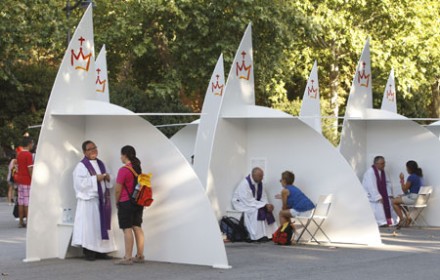
Confession may be in decline in many areas, but some parishes – usually seen as ‘traditional’ – are reversing the trend
By FRANCIS PHILLIPS on Wednesday, 5 September 2012
ABOUT THE AUTHOR

Francis Phillips
Francis Phillips reviews books for the Catholic Herald.
Contact the author

Priests hear Confessions at World Youth Day in Madrid (Photo: CNS)
In an article in the Tablet, John Cornwell, director of the Science and Human Dimension Project at Jesus College, Cambridge, asks what has happened to the Sacrament of Confession, or Reconciliation as it is now called. Apart from certain inner-city parishes like the Brompton Oratory or St James’s, Spanish Place (and although he doesn’t mention it, I feel sure the same is true of St Patrick’s, Soho Square), where there are still queues for Confession, he suggests that a general decline in practice is widespread and has been so for many years. This conclusion accords with my own impression of our local parishes – but not, interestingly, the Oxford Oratory, where Confessions are available during Mass and where I have noted a keen uptake.
Cornwell refers to the late theologian Bernard Haring on this topic, saying he wrote in 1978 “that adult Catholics ceased to confess because so many of them were using artificial contraception, and saw nothing wrong with it. He might have added other stumbling blocks: sex before marriage; gay relationships; what Häring calls ‘self-stimulation’; being divorced and remarried… These have caused people to either leave the Church, or simply ignore the teaching on ‘serious’ or mortal sin and the need to confess before receiving the Eucharist. The circumstance has created, in consequence, a remarkable historic split between teaching and practice.”
Several thoughts come to mind on reading this. First, what are the London and Oxford Oratories, for instance, doing right that other parishes get wrong? Could it be that the Oratorians, who place great emphasis on reverent liturgy and who are seen as “traditional”, also preach about the need for Confession as part of the normal spiritual practice of a Catholic life, and follow this up by making it available during Mass to be more convenient for busy, hard-working parishioners? Obviously this isn’t possible in what our late parish priest called “a one-horse parish” ie where there is only one priest to celebrate Mass. But I know from friends that where the Extraordinary Form of the Mass is celebrated, the (single) priest also has a queue for Confession. It seems that old habits, such as the need to examine one’s conscience regularly, die hard in certain circumstances.
Cornwell also doesn’t mention new movements in the Church – or indeed old ones like the Third Orders attached to religious communities, where I would guess the old practice is still strong. Local parishioners and friends who are also members of Opus Dei, for instance, take regular Confession very seriously, as do their priests. What does this say about ordinary parishes where most Catholics who practise their faith attend Mass?
It should also be pointed out that Bernard Haring was one of those post-Conciliar theologians who challenged the Church’s teaching on Humanae Vitae and artificial contraception; I would guess that he also took a “therapeutic” attitude towards the other “stumbling blocks” listed by Cornwell above. If you do away with the concept of sin, you do away with the need for Confession. Was Haring satisfied with the results of his own interpretation of Church teaching? Was he content with this “historic split between teaching and practice”? He might have approved of the Tablet, which takes a somewhat “post-Conciliar” line on the moral teaching of the Church.
These reflections bring me to the memory of the late Fr Hugh Thwaites SJ, who died at the end of August and whose obituary has been in the Herald. Fr Thwaites was, for a short time, the parish priest of a nearby parish. He once told me: “It’s on my conscience that I haven’t preached on the sinfulness of artificial contraception.” He proceeded to do so the following Sunday – with the result that many parishioners “walked away from him”. They found his words too hard. Yet others I know who listened to him and talked to him later decided to change their lives. There have been many tributes to Fr Thwaites for his evident holiness. I think that people describe a priest as holy when it is obvious to them that his deepest and overriding concern is to save souls. He will always attract those who have ears to hear. People are thirsting for the truth, even if they do not know it. When heard, it is irresistible to some, repugnant to others.
Cornwell also remarks: “Conversations with priests and people in different parts of the country raise diverse questions. Does Confession reconcile us to the Church, or to God?” Surely this is an artificial distinction, implying (possibly) that God always forgives while the institution, hidebound by rules and regulations, is fussier. It is through the agency of the priest that we are reconciled to the Church – which is, as the late Mgr Alfred Gilbey wrote in We Believe, Christ lived on in His followers.
Cornwell is researching a book on Confession – hence his article, entitled “Where are the penitents?” His interest is sociological and his investigation is a survey. I can see such research might be valuable in a limited way. But in the end, it is always about one individual on his knees before a priest, remembering the words of Christ: “Repent and be saved.”
No comments:
Post a Comment